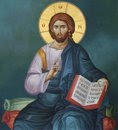«Ζηλούτε
τα πνευματικά». Να επιθυμείτε με ζήλο τα πνευματικά χαρίσματα. Τέτοιο ζήλο σε όλη
του την ζωή είχε
και
ο άγιος Ανδρέας.
Από τους μεγάλους
εκκλησιαστικούς ποιητές ο
Ανδρέας, γεννήθηκε στην Δαμασκό
από γονείς ευσεβείς, τον Γεώργιο
και την Γρηγορία. Σε ηλικία 15 χρονών, κατατάχθηκε στον κλήρο (αναγνώστης) του
πατριαρχικού θρόνου των Ιεροσολύμων, από τον τότε Πατριάρχη Θεόδωρο.
Στην Ιερουσαλήμ, ο Ανδρέας διακρίθηκε για την μόρφωση
και την αρετή του μεταξύ των αγιοταφιτών πατέρων, γι’ αυτό και τον προέκριναν να σταλεί στην Κωνσταντινούπολη, για την έκτη Οικουμενική
Σύνοδο κατά των Μονοφυσιτών. Μετά το τέλος της Συνόδου, ο Ανδρέας παρέμεινε στη
βασιλεύουσα, όπου χειροτονήθηκε διάκονος και διορίσθηκε
διευθυντής του ορφανοτροφείου
«Άγιος Παύλος». Η έξοχη
επιμέλεια που ανέπτυξε στο φιλανθρωπικό
αυτό ίδρυμα, τον
ανέδειξε αρχιεπίσκοπο Κρήτης.
Αφοσιωμένος στα
καθήκοντα της νέας
του θέσης, σναδείχθηκε
μέγας εκκλησιαστικός διοικητής, αλλά και
λαμπρός διδάσκαλος και ρήτορας. Γι' αυτό και
όλο του το
ποιμνίο τον θεωρούσε πραγματικά πατέρα.
Αλλά ως
μητροπολίτης πήρε μέρος στην σύνοδο που
συγκάλεσε ο Φιλιππικός Βαρδάνης (712) και υποστήριξε τον Μονοφυσιτισμό, αλλά
επανήλθε στην
ορθή πίστη μετά τον θάνατο
του Βαρδάνη. Στο
γυρισμό από την Κωνσταντινούπολη, όπου
είχε πάει για διάφορες υποθέσεις, πέθανε (740 μ.Χ.)
επάνω στο καράβι.
Τον έθαψαν στην Ερεσσό της
Μυτιλήνης, στο ναό της Αγίας Αναστασίας.
Να σημειώσουμε επίσης, ότι ο Άγιος Ανδρέας, συνέθεσε και αρκετά μουσικά τροπάρια και κανόνες. Ένα από τα σπουδαία έργα του είναι και ο Μέγας Κανόνας, που ψάλλεται την Πέμπτη της Ε’ εβδομάδος Νηστειών της Μ. Τεσσαρακοστής.
Να σημειώσουμε επίσης, ότι ο Άγιος Ανδρέας, συνέθεσε και αρκετά μουσικά τροπάρια και κανόνες. Ένα από τα σπουδαία έργα του είναι και ο Μέγας Κανόνας, που ψάλλεται την Πέμπτη της Ε’ εβδομάδος Νηστειών της Μ. Τεσσαρακοστής.
Απολυτίκιον. Ήχος πλ. α’.
Τον Συνάναρχον
Λόγον.
Του Δαβίδ την κινύραν Πάτερ μιμούμενος, εν Εκκλησία Οσίων προσᾴδεις άσμα καινόν, ως σοφός υφηγητής του θείου Πνεύματος· συ γαρ εβρόντησας ημίν, τας της χάριτος ωδάς, και λόγον δικαιοσύνης, Ανδρέα Πατέρων κλέος, προς σωτηρίαν των ψυχών ημών.
Του Δαβίδ την κινύραν Πάτερ μιμούμενος, εν Εκκλησία Οσίων προσᾴδεις άσμα καινόν, ως σοφός υφηγητής του θείου Πνεύματος· συ γαρ εβρόντησας ημίν, τας της χάριτος ωδάς, και λόγον δικαιοσύνης, Ανδρέα Πατέρων κλέος, προς σωτηρίαν των ψυχών ημών.
Κοντάκιον. Ήχος β’. Τα άνω ζητών.
Σαλπίσας τρανώς, τα θεία μελῳδήματα, εδείχθης φωστήρ, τω κόσμω τηλαυγέστατος, τω φωτί λαμπόμενος, της Τριάδος Ανδρέα Όσιε· όθεν πάντες βοώμέν σοι· Μη παύση πρεσβεύων, υπέρ πάντων ημών.
Σαλπίσας τρανώς, τα θεία μελῳδήματα, εδείχθης φωστήρ, τω κόσμω τηλαυγέστατος, τω φωτί λαμπόμενος, της Τριάδος Ανδρέα Όσιε· όθεν πάντες βοώμέν σοι· Μη παύση πρεσβεύων, υπέρ πάντων ημών.
Μεγαλυνάριον.
Χαίροις ευσεβείας θείος αυλός, και της Εκκλησίας, θεορρήμων υφηγητής· χαίροις ο εν λόγοις, και άσμασιν ενθέοις, Τριάδα μεγαλύνων, Ανδρέα πάνσοφε.
Χαίροις ευσεβείας θείος αυλός, και της Εκκλησίας, θεορρήμων υφηγητής· χαίροις ο εν λόγοις, και άσμασιν ενθέοις, Τριάδα μεγαλύνων, Ανδρέα πάνσοφε.
Saint Andrew the
Jerusalem, Archbishop of Crete
"You are lusting
spiritually." To wish the spiritual gifts with zeal. St. Andreas had such
zeal throughout his life.
Among the great
ecclesiastical poets Andreas was born in Damascus by pious parents, George and
Gregory. At the age of 15, he was assigned to the clergy (reader) of the
Patriarchal throne of Jerusalem by the then Patriarch Theodore.
In Jerusalem, Andreas was
distinguished for his education and virtue among the holy fathers, so they were
praised for sending him to Constantinople for the sixth Ecumenical Council
against the Monophysites. After the end of the Synod, Andreas remained in the
reign, where a deacon was ordained and appointed director of the orphanage
"Saint Paul". The exquisite diligence he has developed at this
charity institution has made him Archbishop of Crete.
Dedicated to the duties of
his new position, he became a great ecclesiastical commander, but also a
brilliant teacher and orator. That's why his whole flock actually considered
him a father.
But as a metropolitan, he
took part in the session convened by the Philippian Vardanis (712) and
supported Monophysitism, but returned to proper faith after the death of
Vardane. On his return from Constantinople, where he had gone for various
affairs, he died (740 AD) on the ship. They buried him in Eressos, Mytilene, in
the temple of Saint Anastasia.
Let us also note that
Saint Andreas has composed several musical changes and rules. One of his great
works is the Grand Canon, which is chanted on the Thursday of the Fourteenth
Nineteenth-day Nineties.
Apolyticus. Sound flat a'.
The Synoptic Word.
David, in the Church of
the Father, imitates, in the Church of the Oosians, a chant, as a wise
conqueror of the ungodly Spirit, who has received the grace of the grace, and
the word of righteousness, Andrew of the Fathers, for the salvation of our
souls.
Kontakion. Sound b '. Top
requests.
Psalms 50: 5 And the
scroll of the Lord, and all the blessed, and the light of the light, of the
triumph of Andrew the sonnes; and all of you that are blessed with thee, and
all the blessings of thee;
Majesty.
Rejoice, the uncircumcised
unclean trumpet, and the Church, a humble lecturer; rejoice in this word, and
the voice of an interstell, Trinity of great men, Andrew the asshole.


Δεν υπάρχουν σχόλια:
Δημοσίευση σχολίου